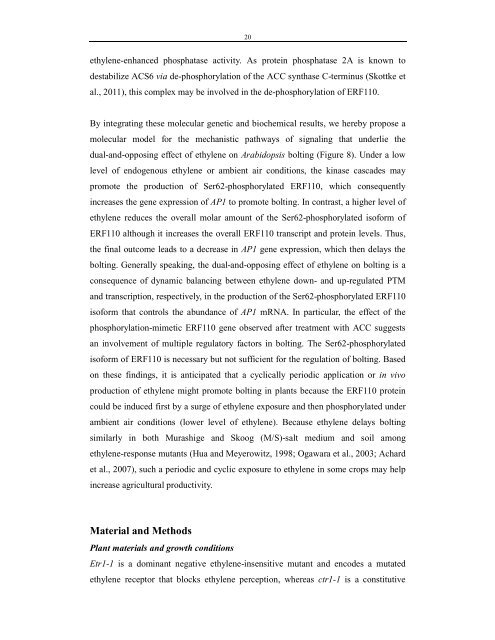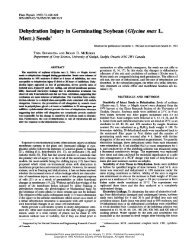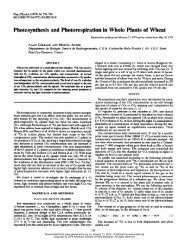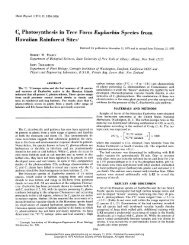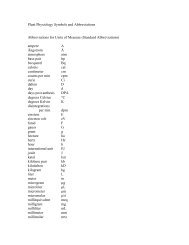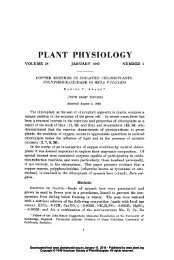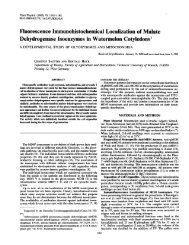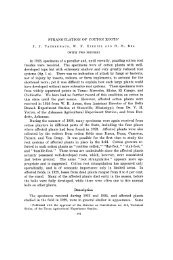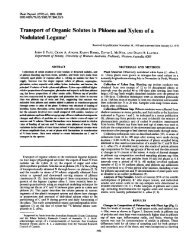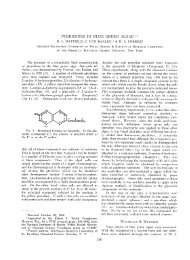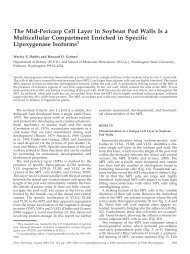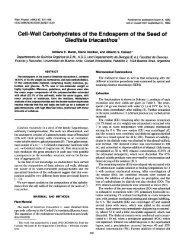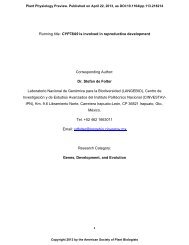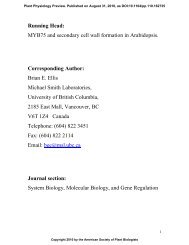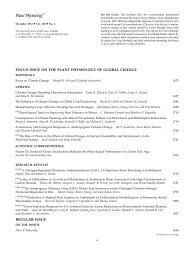Phosphoproteomics-identified ERF110 affects ... - Plant Physiology
Phosphoproteomics-identified ERF110 affects ... - Plant Physiology
Phosphoproteomics-identified ERF110 affects ... - Plant Physiology
Create successful ePaper yourself
Turn your PDF publications into a flip-book with our unique Google optimized e-Paper software.
20<br />
ethylene-enhanced phosphatase activity. As protein phosphatase 2A is known to<br />
destabilize ACS6 via de-phosphorylation of the ACC synthase C-terminus (Skottke et<br />
al., 2011), this complex may be involved in the de-phosphorylation of <strong>ERF110</strong>.<br />
By integrating these molecular genetic and biochemical results, we hereby propose a<br />
molecular model for the mechanistic pathways of signaling that underlie the<br />
dual-and-opposing effect of ethylene on Arabidopsis bolting (Figure 8). Under a low<br />
level of endogenous ethylene or ambient air conditions, the kinase cascades may<br />
promote the production of Ser62-phosphorylated <strong>ERF110</strong>, which consequently<br />
increases the gene expression of AP1 to promote bolting. In contrast, a higher level of<br />
ethylene reduces the overall molar amount of the Ser62-phosphorylated isoform of<br />
<strong>ERF110</strong> although it increases the overall <strong>ERF110</strong> transcript and protein levels. Thus,<br />
the final outcome leads to a decrease in AP1 gene expression, which then delays the<br />
bolting. Generally speaking, the dual-and-opposing effect of ethylene on bolting is a<br />
consequence of dynamic balancing between ethylene down- and up-regulated PTM<br />
and transcription, respectively, in the production of the Ser62-phosphorylated <strong>ERF110</strong><br />
isoform that controls the abundance of AP1 mRNA. In particular, the effect of the<br />
phosphorylation-mimetic <strong>ERF110</strong> gene observed after treatment with ACC suggests<br />
an involvement of multiple regulatory factors in bolting. The Ser62-phosphorylated<br />
isoform of <strong>ERF110</strong> is necessary but not sufficient for the regulation of bolting. Based<br />
on these findings, it is anticipated that a cyclically periodic application or in vivo<br />
production of ethylene might promote bolting in plants because the <strong>ERF110</strong> protein<br />
could be induced first by a surge of ethylene exposure and then phosphorylated under<br />
ambient air conditions (lower level of ethylene). Because ethylene delays bolting<br />
similarly in both Murashige and Skoog (M/S)-salt medium and soil among<br />
ethylene-response mutants (Hua and Meyerowitz, 1998; Ogawara et al., 2003; Achard<br />
et al., 2007), such a periodic and cyclic exposure to ethylene in some crops may help<br />
increase agricultural productivity.<br />
Material and Methods<br />
<strong>Plant</strong> materials and growth conditions<br />
Etr1-1 is a dominant negative ethylene-insensitive mutant and encodes a mutated<br />
ethylene receptor that blocks ethylene perception, whereas ctr1-1 is a constitutive


